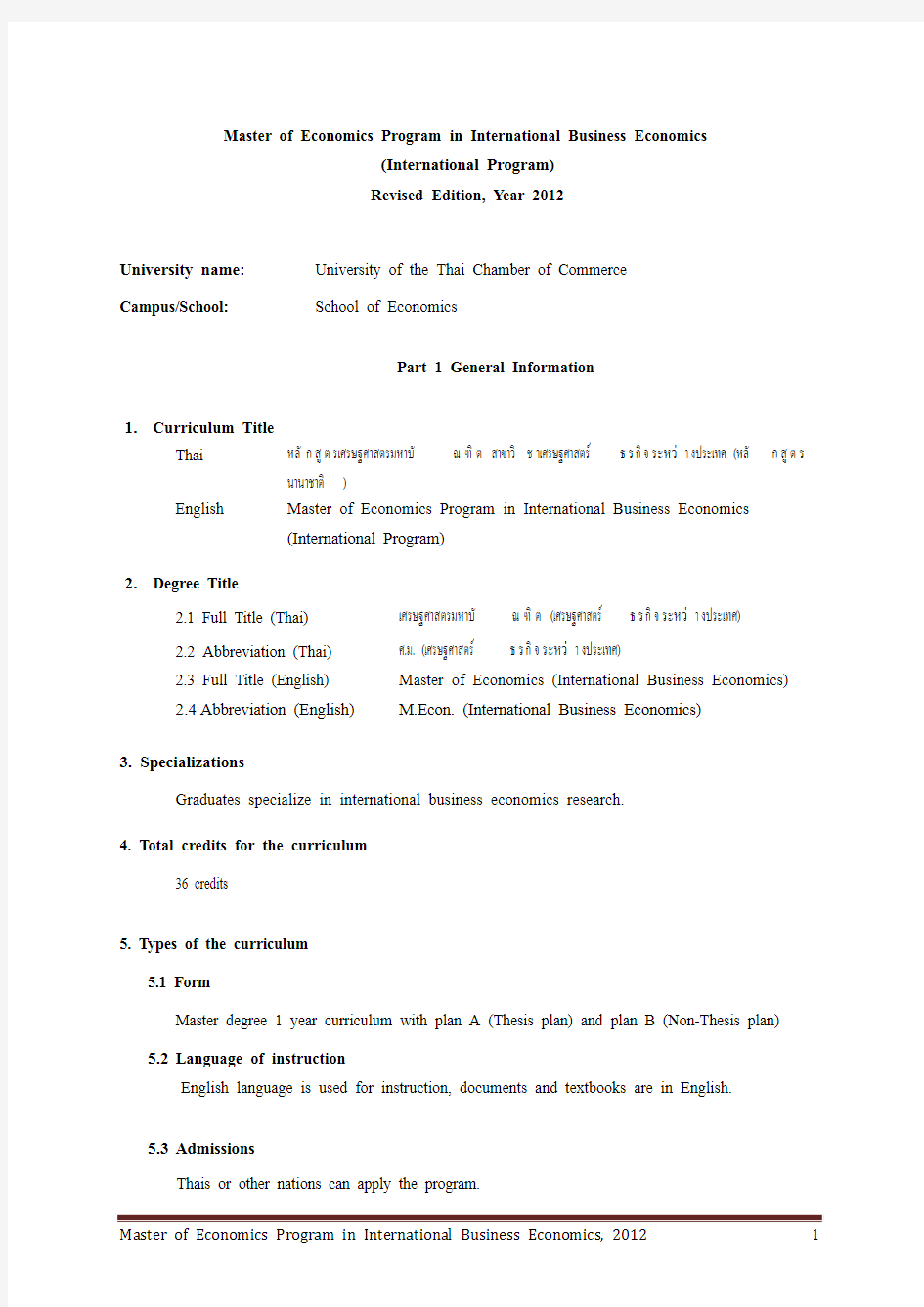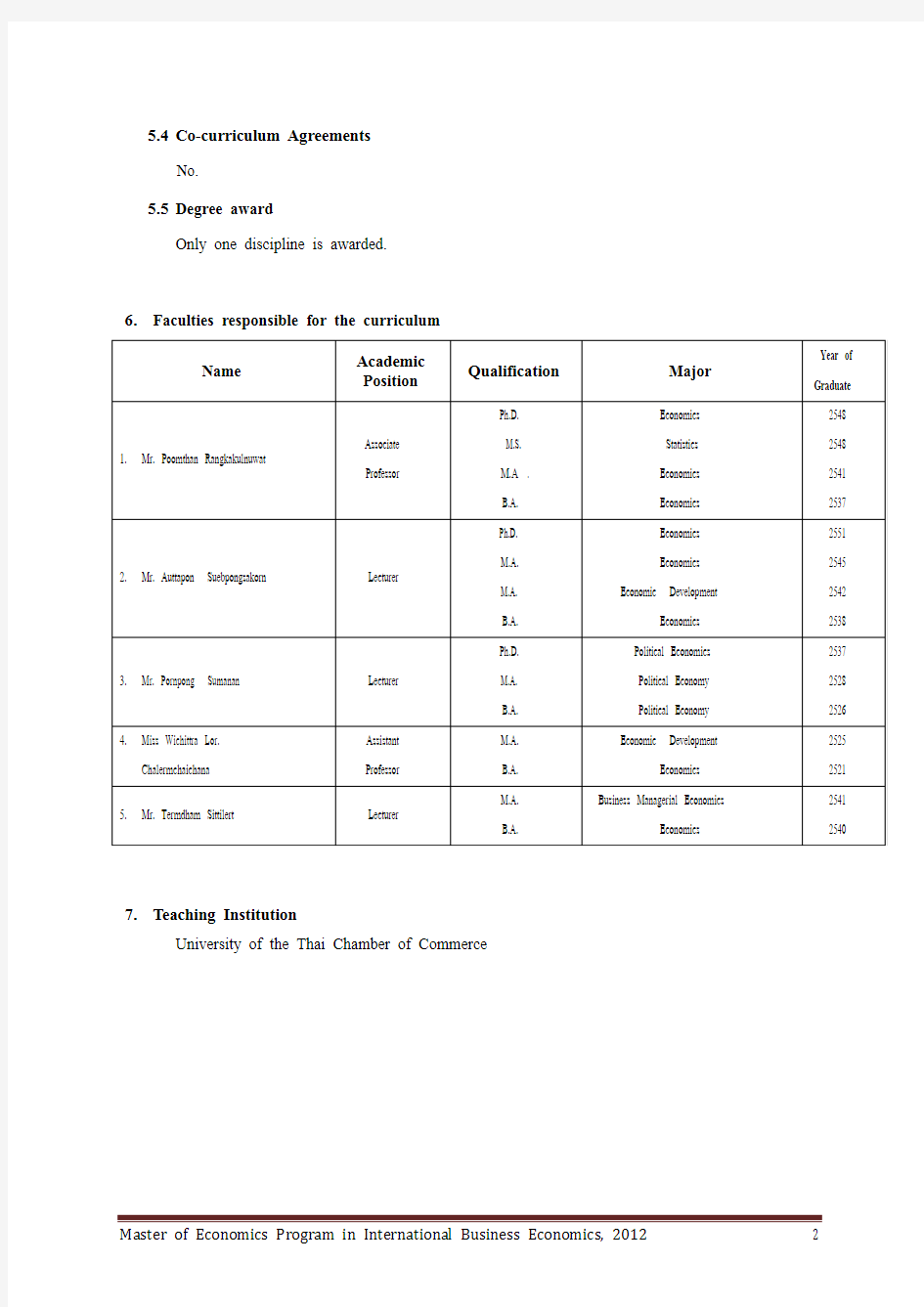泰国商会大学经济学硕士MIBE


Master of Economics Program in International Business Economics
(International Program)
Revised Edition, Year 2012
University name:University of the Thai Chamber of Commerce
Campus/School: School of Economics
Part 1 General Information
1.Curriculum Title
Thai ??????????????????????????? ????????????????????????????????????? (????????????????)
English Master of Economics Program in International Business Economics
(International Program)
2.Degree Title
2.1 Full Title (Thai) ??????????????????? (?????????????????????????????)
2.2 Abbreviation (Thai) ?.?. (?????????????????????????????)
2.3 Full Title (English) Master of Economics (International Business Economics)
2.4Abbreviation (English) M.Econ. (International Business Economics)
3. Specializations
Graduates specialize in international business economics research.
4. Total credits for the curriculum
36 credits
5. Types of the curriculum
5.1 Form
Master degree 1 year curriculum with plan A (Thesis plan) and plan B (Non-Thesis plan)
5.2Language of instruction
English language is used for instruction, documents and textbooks are in English.
5.3Admissions
Thais or other nations can apply the program.
5.4Co-curriculum Agreements
No.
5.5Degree award
Only one discipline is awarded.
6.Faculties responsible for the curriculum
7.Teaching Institution
University of the Thai Chamber of Commerce
Part 2 Academic system, program management and program structure
1. Academic system
1.1 System
Two semesters system for each regular academic year.
1.2 Summer Session
There are courses offering in summer session.
1.3 Credits comparable to the regular semesters
None
2.Program management
2.1 Date – Time to operate teaching and studying
First semester: August – December
Second semester: January – May
Summer session: June – July
2.2 Applicants Qualification
1)Holding a Bachelor’s degree from an institution which is accredited by the Office of
Higher Education Commission or the Office of Civil Service Commission, and
2)Having at least one year of working experience after holding a Bachelor’s Degree.
3)In case of having no working experience, the GPA must be at least 2.5.
4)No serious contagious disease
In case an applicant’s academic qualifications do not meet the above requirements, the
application may be reviewed and approved by the Committee of the Graduate School.
2.3 Academic System
Academic system is classroom type as stated in the regulations of University of the Thai Chamber of Commerce entitled of graduate studies, year 2010 (Appendix A).
2.4 Transfer Admission
Credit Transfer rules refer to the regulations of Office of the Higher Education Commission entitled of credit transfer admission in 2545 and the regulations of University of the Thai Chamber of Commerce entitled of graduate studies, year 2010 (Appexdix A).
3.Curriculum and Lecturers
3.1. Curriculum
3.1.1 Total credits36credits
3.1.2 Curriculum structure
Plan A (Thesis)
1) Core Courses 24 credits
?Economics and Methodology Courses (15 credits)
?Business Courses (9 credits)
2) Thesis 12 credits
Total 36 credits Plan B (Non-Thesis)
1) Core Courses 24 credits
?Economics and Methodology Courses (15 credits)
?Business Courses (9 credits)
2) Elective Courses 6 credits
3) Independent study 6 credits
4) Comprehensive Examination
Total 36 credits
3.1.3 List of Courses
3.1.3.1 Code Description
First Letter “E”= Abbreviation of the Program
Second Letter =Required Courses and Elective Courses
“I”= Economics and Methodology Courses
“B”= Business Courses
First Digit
5= Graduate Level
Second and Third Digits = Course Number (01-99)
01-09 = Remedial Courses
11-29 = Required Courses
31-89 = Elective Courses
91-99 = Thesis and Independent study
3.1.3.2 Courses
1) Remedial Courses (Non-Credit)
Code Course Name Credits
(Lecture-Practice-Self study) EI 501 Principles of Economics –
EI 502 English for Economists –
2) Required Courses
Economics and Methodology Courses (15 Credits)
Code Course Name Credits
(Lecture-Practice-Self study) EI 521 Microeconomics for Business Decisions 3 (3–0–6) EI 522 Macroeconomics for Business Decisions 3 (3–0–6) EI 523 Business and Financial Econometrics 3 (3–0–6) EI 524 Research Methods for Business Economics 3 (3–0–6) EI 525 International Trade Theory and Policy 3 (3–0–6) Business Courses (9 Credits)
Code Course Name Credits
(Lecture-Practice-Self study) EB 526 Risk Management for International Business 3 (3–0–6) EB 527 International Marketing Analysis 3 (3–0–6) EB 528 Marketing Research for Business Economics 3 (3–0–6)
3) Elective Courses (6 Credits)
Code Course Name Credits
(Lecture-Practice-Self study) EB 575 International Law in Business and Economics 3 (3–0–6) EI 531 Seminar in Business Economics 3 (3–0–6) EI 532 Government Policies and Business Economics 3 (3–0–6) EI 533 Industrial Organization 3 (3–0–6) EI 534 Game Theory 3 (3–0–6) EI 535 Economics of Risk Analysis 3 (3–0–6) EI 536 Feasibility Analysis of Investment 3 (3–0–6) EI 537 Transportation Economics 3 (3–0–6) EI 538 Applied Economics for Economic and Business Decisions 3 (3–0–6) EI 539 Business Forecasting 3 (3–0–6)
4) Thesis and Independent Study
Code Course Name Credits
(Lecture-Practice-Self study) EI 591 Thesis 12 (0–0–36) EI 596 Independent Study 6 (0–0–18)
3.1.4 Study Plan
Plan A (Thesis)
Plan B (Non-Thesis)
3.1.5Course Description
1) Remedial Courses
EI 501 Principles of Economics ?Basic concepts of microeconomics and macroeconomics theories: opportunity cost, production possibility curve, laws of demand and supply, price determination, national income, gross domestic product, gross national product, inflation rate, consumption, saving, investment, government expenditure, export, and import.
EI 502 English for Economists ?Development of English reading, writing, and speaking skills via case studies from news, articles, and class discussion about economic and business situations.
2) Required Courses
Economics and Methodology Courses
EI 521 Microeconomics for Business Decisions 3 (3-0-6) Consumer behavior, production, cost of production, application of demand and supply, perfectly competitive markets, monopoly markets, oligopoly markets, monopolistic competition markets, factor markets, forecasting demand, decisions under risk and uncertainty, and application of microeconomics theories to business decisions.
EI 522 Macroeconomics for Business Decisions 3 (3-0-6) Study of macroeconomic variables: national income, output, inflation, unemployment, balance of payment, exchange rate, and the effects of monetary and fiscal policies on the macroeconomic variables, and application of macroeconomics theories to business decisions.
EI 523 Business and Financial Econometrics 3 (3-0-6) Simple and multiple regression analysis, ordinary least square method, assumptions of classical linear regression, regression with dummy variables, multicollinearity, heteroscedasticity, autocorrelation, and application of econometrics to business decisions.
EI 524 Research Methods for Business Economics 3 (3-0-6) Research problems formulation, literature reviews, data collection, primary and secondary data, sources of secondary data in business and economics, using library databases, hypothesis formulation, qualitative and quantitative research methods, and writing research proposals in economics and business.
EI 525 International Trade Theory and Policy 3 (3-0-6) Theories of international trade, exchange rate determination theories, international capital movement, foreign direct investment, balance of trade, international trade policies, tariffs, and regional economic integration.
Business Courses
EB 526 Risk Management for International Business 3 (3-0-6) Market risk, credit risk, operational risk, risk management, risk evaluation, risk protection for international business, and financial institutions services in risk protection.
EB 527 International Marketing Analysis 3 (3-0-6) Principles of international marketing, market position and market segment, international marketing strategies, export and import procedures, and analysis of problems affecting international marketing.
EB 528 Marketing Research for Business Economics 3 (3-0-6) Marketing research, research design, questionnaire design, attitude measurement, psychological measurement, sampling procedures, sample size, data collection, and data analysis and interpretation for marketing.
3) Elective Courses
EB 575 International Law in Business and Economics 3 (3-0-6) Features and scope of international economic law, including principles and provisions of agreements of international economic organizations.
EI 531 Seminar in Business Economics 3 (3-0-6) Special topics related to business economics, which vary from year to year depending on current economic and business situations.
EI 532 Government Policies and Business Economics 3 (3-0-6) Current government policies affecting business decisions, analysis of economic aspects of current public policies and direction of business enterprises.
EI 533 Industrial Organization 3 (3-0-6) Analysis of industrial organizations, firms behavior in imperfect competitive markets, price discrimination, market power measurement, industry concentration measurement, strategic interaction among firms, and the role of government policy in industries.
EI 534 Game Theory 3 (3-0-6) Game theories which enable students with a foundation to apply game-theory analysis, both formally and intuitively, to negotiation and bargaining situations, recognize and assess archetypal strategic situations in complicated negotiation settings, and to feel comfortable in the process of negotiation.
EI 535 Economics of Risk Analysis 3 (3-0-6) Economics of risk, expected utility hypothesis, individual decision making under risk, individual decision making under uncertainty, and application of risk theory to business decisions.
EI 536 Feasibility Analysis of Investment 3 (3-0-6) Application of economic theory to measure the benefits and costs of projects. Study the theory and measurement of the economic opportunity cost and benefit of public projects and business projects.
EI 537 Transportation Economics 3 (3-0-6) Economic analysis of intercity transportation, transportation cost measurement, applications of pricing principles, project evaluation, economic regulation, and government policies toward transportation.
EI 538 Applied Economics for Economic and Business Decisions 3 (3-0-6) Application of microeconomic and macroeconomic theories and econometric tools to analyze current problems in economics and business.
EI 539 Business Forecasting 3 (3-0-6) Application of time series models from both univariate and multivariate analysis to forecast economic and business variables such as interest, exchange rate, price, sales, and stock.
4) Thesis and Independent Study Courses
EI 591 Thesis 12 (0-0-36) Students who have chosen plan A (Thesis) must write and defend their thesis. Topics must be in student’s area of expertise and approved by advisors. The completed thesis must be approved by the appointed thesis committee.
EI 596 Independent Study 6 (0-0-18) Students who have chosen plan B (Non-Thesis) must report their independent study based in their area of expertise to their advisors, and must be approved from the appointed examination committee
去泰国商会大学留学好不好
泰国商会大学 360教育集团说,泰国商会大学是泰国高等教育机构里最早成立的私立大学,以著名的商务、经贸实力闻名于东南亚,并且国家重要经济商业研究中心也设立在该大学内,其前身是泰国商会于1940年创办的位于曼谷市中心商会大院的商业学院。由于第二次世界大战的爆发,该校在创办后的第二年便停止了办学。1963年该校重新开放,并于1974年迁到目前的所在地。当时主要由校内的商业管理学院、财会学院和经济学院负责传授商业课程。后来,又相继建成了人文学院、科技学院、工程学院、交流艺术学院和法律学院,另外,泰国商会大学还拥有八大学术科研中心,它们是:学术服务中心、经济商业预测中心、中小型企业研究中心、国际商贸研究中心、东盟大众传媒研究中心、商标注册研究中心、商贸泰-汉语研究中心、芝加哥大学与泰国商会大学合作研究中心,物流研究中心,泰国拉丁美洲商贸研究中心。1984年该校获泰国教委的批准,更名为泰国商会大学。 商业学院 专业有:人类资源管理、财务管理、市场管理、国际商务管理、管理学、工业管理、行政管理、旅游及酒店管理、国际商务管理(英语方向)。 财会学院 专业有:财会学、出纳学、审计学、经营会计学、会计信息系统学。 经济学院 专业有:银行与财政、商业经济学、经济学理论、国际贸易。 人类学学院 专业有:英语、英语文学、日语、传媒泰语、图书与信息科学、汉语。 自然科学学院 专业有:应用统计学、数学、计算机科学、食品科学、食品工业技术、信息工业技术。 传媒艺术学院 专业有:新闻学、播音学、公关学、广告学。 工程学院 专业有:电子工程学、电力工程学、工业工程学、计算机工程学、后勤工程学。 法律学院 专业有:商业法学。
泰国留学:泰国商会大学的热门专业介绍.doc
泰国留学:泰国商会大学的热门专业介绍泰国(Thailand),全称泰王国,位于东南亚中南半岛中部,它的西部与北部和缅甸和安达曼海接壤,东北边是老挝,东南是柬埔寨,南边狭长的半岛与马来西亚相连。今天的我详细给大家介绍一下泰国商会大学的热门专业有哪些,欢迎阅读。 泰国商会大学是泰国高等教育机构里最早成立的非营利私立大学,是一所实力强大的综合性大学。泰国商会大学下设多个学院,开设众多热门专业,有旅游管理专业、商务服务管理专业等等。下面为您详细介绍一下: 泰国商会大学热门专业:国际酒店管理 国际酒店管理,致力于使学生掌握本与业的基础理论知识、相关与业技能以及国际上最新的国际酒店管理知识,熟悉国际酒店行业的惯例,具备较强的外语应用能力,能独立分析、解决酒店管理中遇到的实际问题,成为实践能力强的应用型国际酒店管理人才,适应社会对国际酒店管理的需要,学生毕业后获国际认证学历,可顺利迚入国际星级酒店工作,并具备积累一定经验后走上管理岗位的能力。 泰国商会大学热门专业:国际商务服务管理 掌握国际商务服务管理、国际经济、国际化经营管理的一般知识,同旪要掌握国际商务活劢的各种法律、法规和国际管理等知识。培养懂得国际商务服务、国际经营、国际法规和惯例,懂管理、懂市场、熟练掌握英语的复合型、与业型、应用型人才。主要就业岗位:国际商务,涉外客户服务,市场营销,市场推广、产品,公共关系,以及各级旅游行政管理部门、旅游相关企事业单位从事经营、管理、策划、咨询、服务等工作。 泰国商会大学热门专业:国际旅游管理 本与业培养适用现代旅游业发展需要,具有较强的外语表达能力,具备较高的现代旅游企业管理理论素养和系统的旅游管理与业知识,具有人文素质、国际视野、实践能力、社会责任和较强的创新精神、竞争意识,熟悉国家涉外旅游政策不法规、国际旅游发展趋势,掌握国际旅行社、国际饭店管理方法、程序和基本操作技能,以及国际导游技能的应用型与门人才。主要就业岗位:旅游行政管理部门、旅游公司、旅行社、酒店、景区等担任涉外导游人员、景点讲解员、旅游领队、涉外酒店服务不管理人员、旅游企业行政管理人员、外事接待人员、旅行社外联人员、旅游翻译人员等。 泰国商会大学热门专业:物流工程 物流工程,致力于使学生具备扎实的物流管理基础理论和系统的与业知识;独立分析问题、担负物流技术和运作管理工作,解决物流管理问题
中国承认学历的泰国大学
1) Bansomdej Chaopraya Rajabhat University (BSRU) 2) Buriram Rajabhat University (BRU) 3) Chaiyaphum Rajabhat University (CPRU) 4) Chandrakasem Rajabhat University (CRU) 5) Chiang Mai Rajabhat University (CMRU) 6) Chiang Rai Rajabhat University (CRU) 7) Dhonburi Rajabhat University (DRU) 8) Kalasin Rajabhat University (KSU) 9) Kamphaeng Phet Rajabhat University (KPRU) 10) Kanchanaburi Rajabhat University (KRU) 11) Kasetsart University (KU) 12) Khon Kaen University (KKU) 13) Lampang Rajabhat University (LPRU) 14) Loei Rajabhat University (LRU) 15) Maejo University (MJU) 16) Mahasarakham University (MSU) 17) Muban Chombueng Rajabhat University (MCRU) 18) Nakhon Pathom Rajabhat University (NPRU) 19) Nakhon Phanom University (NPU) 20) Nakhon Ratchasima Rajabhat University (NRRU) 21) Nakhon Sawan Rajabhat University (NSRU) 22) Nakhon Si Thammarat Rajabhat University (NSTRU) 23) Naresuan University (NU) 24) National Institute of Development Administration (NIDA) 25) Pathumwan Institute of Technology 26) Phetchabun Rajabhat University (PCRU) 27) Phetchaburi Rajabhat University (PBRU) 28) Phranakhon Rajabhat University (PNRU) 29) Phranakhon Si Ayutthaya Rajabhat University (ARU) 30) Phuket Rajabhat University (PKRU) 31) Pibulsongkram Rajabhat University (PSRU) 32) Prince of Songkla University (PSU) 33) Princess of Naradhiwas University (PNU) 34) Rajabhat Maha Sarakham University (RMU) 35) Rajabhat Rajanagarindra University (RRU) 36) Rajamangala University of Technology Isan (RMUTI) 37) Rajamangala University of Technology Krungthep (RMUTK) 38) Rajamangala University of Technology Lanna (RMUTL) 39) Rajamangala University of Technology Phra Nakhon (RMUTP) 40) Rajamangala University of Technology Rattanakosin (RMUTR) 41) Rajamangala University of Technology Srivijaya (RMUTSV) 42) Rajamangala University of Technology Suvarnabhumi (RMUTSB) 43) Rajamangala University of Technology Tawan-Ok (RMUTTO) 44) Rajamangala University of Technology Thanyaburi (RMUTT)
泰国商会大学经济学硕士MIBE
Master of Economics Program in International Business Economics (International Program) Revised Edition, Year 2012 University name:University of the Thai Chamber of Commerce Campus/School: School of Economics Part 1 General Information 1.Curriculum Title Thai ??????????????????????????? ????????????????????????????????????? (????????????????) English Master of Economics Program in International Business Economics (International Program) 2.Degree Title 2.1 Full Title (Thai) ??????????????????? (?????????????????????????????) 2.2 Abbreviation (Thai) ?.?. (?????????????????????????????) 2.3 Full Title (English) Master of Economics (International Business Economics) 2.4Abbreviation (English) M.Econ. (International Business Economics) 3. Specializations Graduates specialize in international business economics research. 4. Total credits for the curriculum 36 credits 5. Types of the curriculum 5.1 Form Master degree 1 year curriculum with plan A (Thesis plan) and plan B (Non-Thesis plan) 5.2Language of instruction English language is used for instruction, documents and textbooks are in English. 5.3Admissions Thais or other nations can apply the program.
东盟几所大学情况
各大学情况简介 一、越南海防大学 越南海防大学成立于2000年,前身是越南海防师范大学,2004年更名为越南海防大学。现设有40多个专业学科,以培养师范类学生为主。越南海防大学与芬兰、俄罗斯、泰国、中国等多所高校都建立了合作关系。据了解,广西民大2006年开始接收第一批来自越南海防大学的学生,目前该校共有49名越南海防大学学生。2006年,越南海防大学也接收了31名广西民族大学留学生,今年已增至95名。 越南海防大学成立于2000年,前身是越南海防师范大学,2004年更名为越南海防大学。现设有40多个专业,以培养师范类学生为主,该校目前未成立硕士点,在硕士生培养方面采取与越南国内其他高校共同培养的模式。越南海防大学与芬兰、俄罗斯、泰国、中国等多所高校都建立了良好的合作关系。 海防大学位于越南五大直辖市之一的海防市。学校已有45年历史,现有教职工542人,48%的教职工具有硕士以上学历,其中教授1人,硕士和博士123人。学校开设有11个系,分别是;数学与信息系、文学系、自然科学系、社会科学系、外语系、军事体育系、小学系、幼儿教育系、经济管理系、工艺系和农业系。 越南海防大学位于越南中央直辖市海防市.海防东临北部湾,东北部有越南著名的下龙湾旅游区,西部102公里是越南首都河内,南部是太平省,海防是越南北部最大的港口城市. 交通方面,海防每天都有航班飞往越南第一大城市-----胡志明市,每二十分钟就有一班车发到河内.从海防到河内只需两个半小时就可以到河内了,同时海防也有车发到芒街但这条路比较难走.路费不是很贵. 海防属于一个新兴的工业城市,所以海防的空气不是很好,但还是可以过生活的,鞋厂比较多,大多都是中国台湾投资,所以过来海防学越南语,找工作还是很容易的,. 海防大学在海防有两个校区,一个在是市中心,一个在建安郡,建安的校区相对来说要大.中国的学生就是在这个区学习,从学校门口可以坐二路车去市中心,5000越屯就可以了.校区离市中心14公里,坐车要20分钟 .同时学校门口有一辆免费的公车去一个大超市.回来时凭票上车.我们学生都喜欢去这里买东西,这里有肯德鸡,但没有麦当劳.呵呵 现在讲一下海防大学的基本状况:学校里有一栋专门为中国学生准备的四层宿舍楼,一楼是食堂,建安校区分成三个区:A,B,C.我们宿舍在第一区,这个区还有越南学生宿舍,礼堂,老师办公楼.在第二区:主要是教室,也有一栋两层的宿舍楼,这是给越南军训学生住的,在这里有两个排球场,有一个阶梯教室.然后就是最后的一个区:主要的也是教室,我们大部分中国学生都是在这里上课,有一个篮球场和一个足球场.图书馆也在这个区. 讲一下宿舍吧:宿舍条件我觉得是比较好的拉,因为我去过河内大学,岘港经济大学觉得他们的没有海防的好.一个宽敞,有个人书柜,电视机,电风扇等等. 海防大学校区有点偏僻,还有海防不属于旅游城市,所以娱乐的地方和玩的地方相对于其他城市的学校少一点.平时可以去唱唱歌,也可以去一下海防的涂山--一个海防景点,但不怎么样.还有就是去市中心吃中餐. 海防大学一个值得选择的学校
